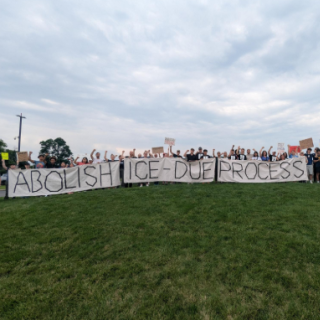Advertisement
This week, people who were deported were SEEN and HEARD on Capitol Hill (pictured above), thanks to their loved ones and volunteers who blanketed the Hill with free ebook flyers and paperback copies of Broken Hope: Deportation and the Road Home. Read all about it and watch a video of our press conference here. The day was cosponsored by the Ohio Immigrant Alliance and Center for Law and Social Policy.
For many Ohio fathers and their children, this Sunday will mark another Father’s Day apart. Listen to this Ohio Newsroom story about fathers who will be spending this day alone, and help the Keita boys visit their dad after six years by donating to and sharing our fundraiser.
Read excerpts from Lia Chien’s article about #ReuniteUS advocacy on Capitol Hill for States Newsroom below. Check out the Center for Law and Social Policy’s new policy recommendations here.
Tina came to the U.S. when she was three years old and had resided under Deferred Action for Childhood Arrivals (DACA) status — a program for undocumented people brought to the United States as children — until her incarceration. She hasn’t seen her children in eight years, Wafaa Hamdi said.
“There’s a lot of kids, a lot of people in general, that have a loved one that they cannot see and that they used to go to sleep or wake up to every day and they no longer get to,” said Wafaa.
Tina’s son also spoke up. “I’m here because I miss my mom,” he tearfully said.
When former President Donald Trump took office, deportations to Africa increased by 74 percent compared to the Obama administration, according to Tramonte and Setty. Trump also enacted several travel bans from primarily African and Muslim countries during his first year in office.
Omar Toumbou, a Maryland resident, spoke to the effect historical Western colonization in Africa has had on deportations. Toumbou’s uncle, Abdoulaye Thiaw, was deported to Mauritania.
Toumbou pointed to damaging effects of Western colonization, like political and economic instability, as the primary driver of Africans fleeing to the U.S. He said reformed immigration policies must take into account the systemic violence many Africans have fled.
“A lot of these things are a result of decades of neglect and also decades of blatant assault on Africa as a continent,” he said. “We need to change the way that we actually look at the continent as a whole.”
Demba Ndiath, an Ohioan whose close family member was deported to Mauritania, said language barriers, inadequate translators, and a lack of financial services for legal services make it difficult for people to argue their case to stay.
Ndiath reminded listeners that they were making a difference for their loved ones.
“I wish they could see everybody who’s here,” he said. “Standing up for them, meeting with members of Congress, advocating for them. I think we’re building hope for them.”
Donate to the Keita family fundraiser at http://bit.ly/KeitaBoys.



